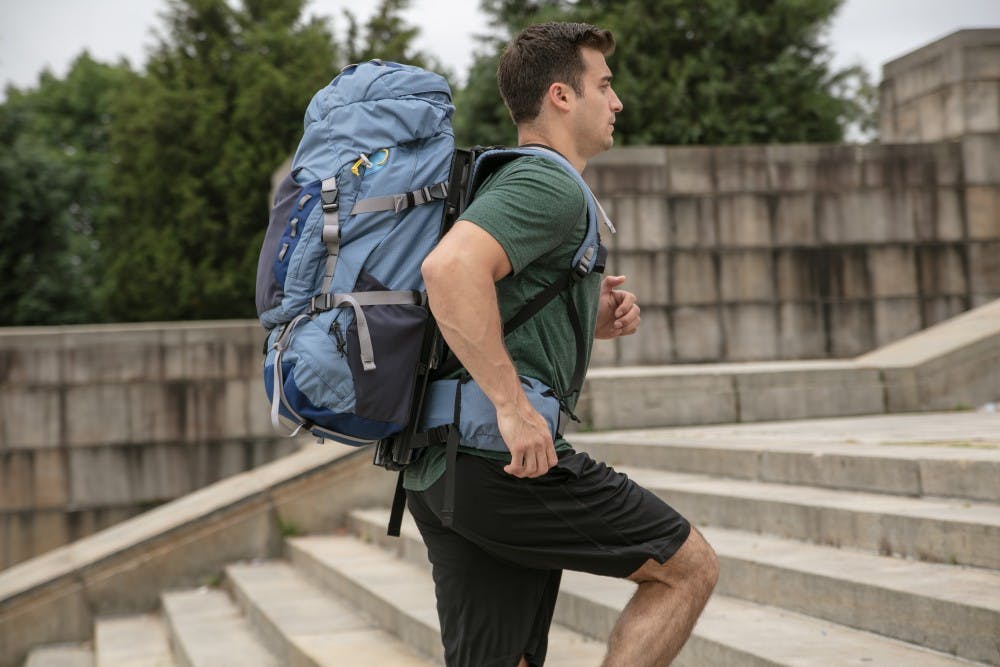
A lighter “floating” backpack has become a reality, thanks to Penn professor Lawrence Rome.
To reduce stress on backs, necks, knees, and ankles, Rome created HoverGlide, the world’s first “floating” backpack. Using patented Suspended Load Technology, HoverGlide reduces up to 86 percent of impact forces on users while walking or running.
Rome said that first impressions of the HoverGlide are often “That’s fake!” or “Is it magic?” due to the weightless appearance of the backpack.
“It looked like it was some type of visual effect,” College freshman Hope Cho agreed.
So how does it work?
The suspension system suspends the load from the backpack frame using elastic bungee cords, reducing its vertical movement and, therefore, reducing drag on the user. The double-frame system features a fixed frame that goes on the users’ backs and a moving frame with the bag that slides across the fixed frame.
In developing HoverGlide, Rome found that he had to use his knowledge as a biology professor in conjunction with his acquired knowledge as a researcher.
As an expert on the function of fish muscle while swimming, Rome said, “I knew nothing about human locomotion from a research perspective.”
Teaching biology at Penn gave him a more general knowledge of biology which he used to create suspended-load backpacks.
“You teach a broader swath of subjects than you might focus on in your research. … I know from teaching that when you walk, the hip goes up about three inches on every step,” Rome said.
His knowledge of vertical hip movement causing a loaded backpack to accelerate with each step and imposing great force on the user was the beginning of Suspended Load Technology.
Rome created HoverGlide particularly for military personnel and first responders to alleviate strain and prevent injury during physical exertions.
Rome started designing backpacks for the United States military in 2002, initially designing a backpack that could generate energy from the movement of the wearer. This invention looked to help the United States Special Forces power electronic equipment on extended expeditions, since batteries are often heavy to carry over extended periods of time.
In creating Suspended Load Technology, Rome realized the potential to make a backpack that feels lighter.
Wharton and College junior Hope Lu, Rome's former student, worked on HoverGlide, focusing on different frames for people of smaller size and women, as well as advertising, and social media.
When first trying on the pack, Lu said, “It did take a little bit of getting used to, because the pack is moving around, and you are not used that kind of motion.”
While the backpack is currently on sale for the public, Lu said it currently may not be affordable for the everyday user.
“If the early adopters are really impressed by it, and show they are behind this product and it's worth the price, it could become a bigger thing, but it’s definitely a little bit uncertain right now, since it is a pretty high price point for the average consumer,” Lu said.
However, the Kickstarter Campaign for HoverGlide reached their funding goal of $75,000 in about four hours on Sept. 18, 2018, according to the Kickstarter website, showing some promise for the commercialized packs.

HoverGlide comes in four different packs: the Trekker, Tactical, Hiker, and Commuter. The Trekker is the largest model for multi-day hikes and holds up to 55 liters. The Tactical is ideal for training, first responders, soldiers, and other high physical exertions, holding up to 30 liters. The Hiker is meant for casual day hikes, and the Commuter for daily commuting, such as going to the office or school.
Cho said that Penn students may not find HoverGlide useful. "I think in college, generally, not many people have heavy loads."
Other usages that Rome has seen are as golf club bags, baby carriers, and photograph equipment bags.
“Once it gets out, people dream up of all sorts of ways to use them,” Rome said.
The Daily Pennsylvanian is an independent, student-run newspaper. Please consider making a donation to support the coverage that shapes the University. Your generosity ensures a future of strong journalism at Penn.
Donate




